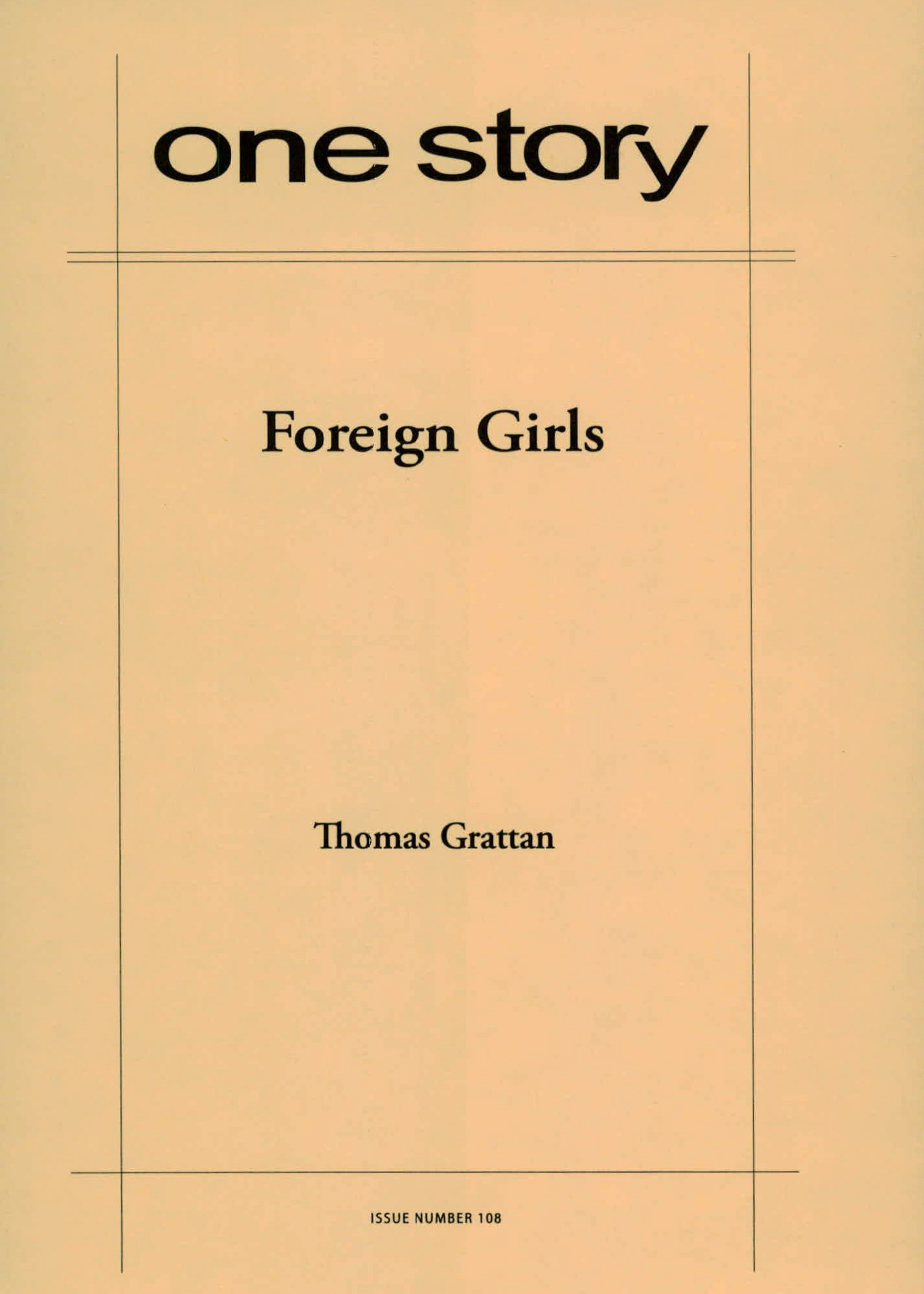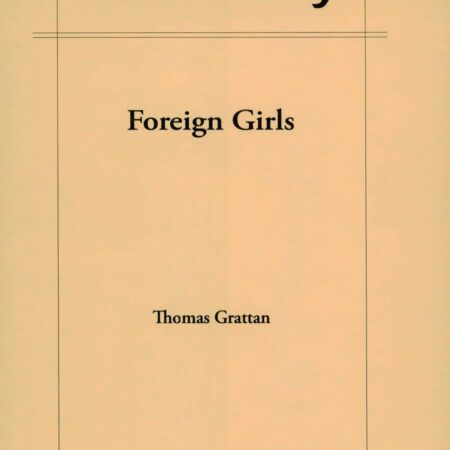
Foreign Girls
$2.50
40 in stock
Excerpt
Lore woke up crumpled on the sofa, a voice on the answering machine droning, a coat blanketing her shoulders. The sweater she’d worn on her flight back to the States was balled up under her head. Her suitcase was open, its contents in piles on the carpet. Surveying the room and sunny, arctic afternoon outside, Lore wasn’t sure where she was. It wasn’t her aunt’s apartment in Düsseldorf, a place she’d recently emptied and scrubbed for new tenants. But it didn’t look quite like her house in Albany either. Toiletries were scattered across the coffee table that was, as a rule, uncluttered. Pearls and pendants she’d just inherited sat there too, tangled together like uncombed hair. Standing up, remembering that this mess was indeed her own, Lore felt certain the room would never recover.
“What?” Lore barked as the phone rang again. “What, what, what?”
It was Stephen in Cleveland, his fourth call since her return to Albany nine hours before. In his first message he’d wanted to know if she made it across the Atlantic without incident. The second went on about the awful hotel food he had to contend with for another four days, and about Ohio’s different, grayer weather. “It’s your husband,” the third message began. “Just in case you’d forgotten.”
Thomas Grattan
Thomas Grattan is a graduate of the Brooklyn College M.F.A. program, where he won the Lainoff Prize for fiction. He’s most recently been published in Colorado Review as the 2007 winner of the Nelligan Prize for Short Fiction judged by Charles Baxter.
Q&A by Hannah Tinti
- HT: Where did the idea for this story come from?
- TG: “Foreign Girls” was initially inspired by a friendship that my mother, who is German, had with a Georgian woman. What interested me about this friendship was the inherent connection these women seemed to have, and how being foreigners related to that. So the story was my way of exploring the notion that being foreign creates some sort of understanding, examining the ways in which that is and isn’t true. That being said, the more I worked on this story, the less it became about this particular friendship. But their relationship served as a good jumping off point as I began writing.
- HT: Houses (the concrete buildings and physical spaces) are juxtaposed with homes (in the metaphorical sense) in this story. Were you conscious of that theme while writing?
- TG: I think that what it means to be and have a home is essentially linked to the notion of foreignness. Home as an idea seems to become more complicated for a person after they’ve moved to another country, or at least it becomes more fractured. Houses—Lore and Stephen’s, the hovel, Aunt Charlotte’s apartment—play an important role in the story. But none of them especially seem like home to Lore, or they do on rare occasions. The closest she feels to having a home are the few moments she’s in the hovel, a place she formerly derided. I didn’t begin writing the story thinking about the idea of home, but in creating the characters and the plot, the contrast between houses and homes became an essential part of the piece. This juxtaposition continued to emerge more clearly during the revision process.
- HT: Did your own notion of home influence the story in any way?
- TG: That’s a good question, and of course it means I should know what my own notion of home would be. I guess I see home as a transient idea. In the same way people feel happy at particular moments and then not, I think feeling at home has that same changeable quality. In this story, for example, Lore seems to feel most at home when she is in the hovel with Nino and Fillip. And yet, as the relationship between these three characters change, so does the way they fit into Lore’s vision of home. I suppose I see home as something that’s always in flux, meaning that the search for home is something that continues to evolve and change too.
- HT: The story is set in Albany, but the two main characters are from Germany and former Soviet Georgia. What about these places and nationalities inspired you?
- TG: Upstate New York and Germany are places where I’ve spent a lot of time, so the notion of foreignness regarding those two places was something I felt was important to write about. Soviet Georgia came out of the situation that originally inspired the story.
- HT: The narrative voice is very controlled in this story—without a lot of modulation. Was this a deliberate choice because the protagonist is German? Does the flatness in the voice contribute to a sense of foreignness?
- TG: The control in the voice is very much connected to Lore, as she is a character who exerts a quiet control over her world. Being that the story is told in a close third, there is something reserved in the voice that needed to match the reserve Lore holds tight to. She is a woman who holds a lot of things in, and analyzes her actions and the actions of others in a detailed, private way. It was important to me that the voice reflected this aspect of Lore.
- HT: Nino’s fur coat is described in great detail. Where did the image of that coat come from?
- TG: It was important that Nino made a strong entrance, and this draping, mangy fur coat did a lot to give her first moment in the story an exclamation point of sorts. Lore is startled by Nino, but also curious. I wanted the reader to feel that too. I also wanted an immediate physical contrast between Nino and Lore. The fur worked on this level too, especially considering Lore’s summery outfit in the first scene. The notion of wearing fur also seems to me a bit of a hold over from a different time, or at least a different place. Wearing a fur in the US now is associated with certain kind of wealth, whereas for Nino the coat is utilitarian. In a way it served as a concrete marker of her foreignness. The way she wears it all the time, even though it’s falling apart, reveals a lot. As does the fact that she keeps it on, even in spring, when it’s too hot for it. This shows a stubbornness in her character. I remember being in a class with Josh Henkin in grad school where he told us not to orphan our details. The coat became an important detail for Nino, one that showed so much about her character and therefore needed to crop up in the story’s pivotal moments.
- HT: The two women in this story (Lore and Nino) are referred to as “the foreign girls.” At the beginning of the story, Lore seems to think that she and Nino have a lot in common because they are both from foreign countries, but by the end of the story, Lore’s sense of estrangement seems to be the result of more than her nationality. How does her sense of foreignness change as the story progresses?
- TG: There is a notion, often a false one I think, of a shared experience among people simply because they are foreign. This was one of the main things I wanted to tackle, one of the ideas driving me to write this story in the first place. Being a foreigner can be an especially isolating experience and there is a certain camaraderie in being an outsider. So at first, the connection Lore feels with Nino is largely based on what the two of them are not. As the story progresses, it becomes more about Lore’s desire for a sense of home that she has never felt—not in Germany or the United States—and less about being foreign in particular. Lore’s life is shaped as much by isolation as it is by foreignness. Her brief courtship with Stephen before they married and her willingness to drop an entire life in a different country, speaks of her long-standing desire for some sort of real connection. It’s Lore’s realization that being foreign isn’t the cause of this isolation that, for me, is the saddest part of the story.
- HT: What is the best bit of advice about writing you have ever received?
- TG: I’ve been fortunate to have had a lot of amazing writing teachers, so it’s difficult to pick one piece of advice. The most practical piece of advice I’ve gotten came from Michael Cunningham who, in my first grad school class at Brooklyn College, said that, beyond some basic level of talent, the only difference between a successful writer and an unsuccessful writer was the willingness to sit one’s ass in the chair every day, especially when it’s difficult and others might have given up. So my ass in the chair at the end of the day seems to make the biggest difference. Or maybe that piece of advice speaks to a certain OCD I have. Either way, I’ve seen the biggest changes in my writing when I’m really following that advice.
- HT: How long did it take you to complete this story?
- TG: I worked on this story on and off for about eight months. It’s a story that went through a lot of incarnations, particularly in the last few months when I worked on it with Elliott and Hannah at One Story, both of whom offered me a lot of brilliant editing suggestions. The earlier drafts of the story were more disparate, quite a bit murkier.
- HT: What are you working on now?
- TG: I am working on the first draft of a novel, tentatively titled Insects of the Southern Hemisphere. Never has the sitting my ass in the chair advice seemed more necessary or confounding.
